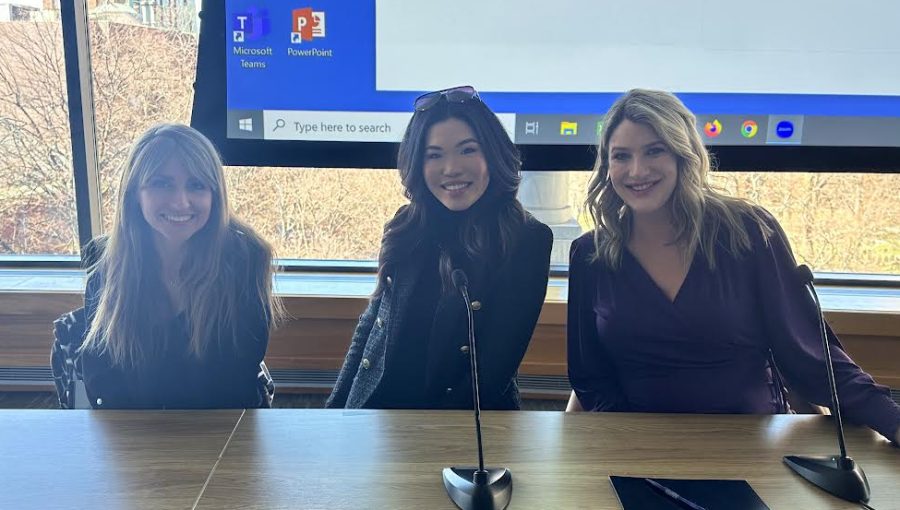Suffolk University’s Career Center, in partnership with Her Campus Suffolk, hosted the Women in Media panel March 30, an opportunity for students to learn about the experiences of women in the media from four Suffolk alumni.
From production to broadcasting, each panelist represented a different facet of what can be done with a Suffolk degree.
Two panelists, Breana Pitts and Tiffany Chan, both work at WBZ-TV, utilizing their broadcast journalism degrees earned in 2012 and 2013, respectively. Angela Bray, a 2013 graduate with a degree in print and web journalism, works at Metter Media. Inuka Bacote, a 2001 Suffolk Law School graduate, rounds out the panel. Bacote is a producer known for works like “Summer of Soul” and “Eastsiders.”
This panel touched on the struggles of having a job in the media, along with how rewarding it can be.
In many media careers, workdays are not the typical nine-to-five. Social media marketing has to be on top of every trend or viral video to be able to give their clients the representation that they are looking for. In broadcast journalism and reporting, there is no time off. According to the panelists, working on holidays or weekends year-round can be considered normal in the industry.
“This is a job that will require you to be there. You have to be there. You’re there on Christmas, or there on weekends. I had my first Christmas off last year in nine years,” said Pitts.
According to Bacote, the lack of breaks can be mentally draining, but many journalists get a form of instant gratification by seeing their stories published or run on TV. However, film production can take a decade before it is ready to be released.
“In 2012, I was asked to come on board that project [Summer of Soul]. In 2020, I think it premiered at Sundance [Film Festival]. So it was a 10-year journey. And not much has changed from the story. It’s just the time and the climate of the industry that changed,” said Bacote.
The panelists discussed how women in the media also must combat viewers holding them under a microscope, picking apart what they are wearing, how they talk, what lipstick they are wearing and any other superficial comment that can be made. According to Pitts, these observations can be a deterrent for young women and girls that are interested in going into the field.
“There are more and more women in [media professions]. I will say though, the amount of scrutiny, and I don’t know what you’ve experienced, but I’ve gotten the emails before about [things] like, ‘I hate the dress that you’re wearing today,’ or ‘I don’t like your hair,’” said Pitts.
Journalists and others who work in the media are also faced with difficult and emotionally stressful stories that can negatively impact their mental health.
When asked about how to deal with those topics and the impact on mental health, Chan said, “The next day is a new day. And I also think that’s what helps in our industry, too. You know, our deadlines at the end of the day, we rarely ever carry assignments to the next day. So you really have to learn that you have to put it behind you.”




















